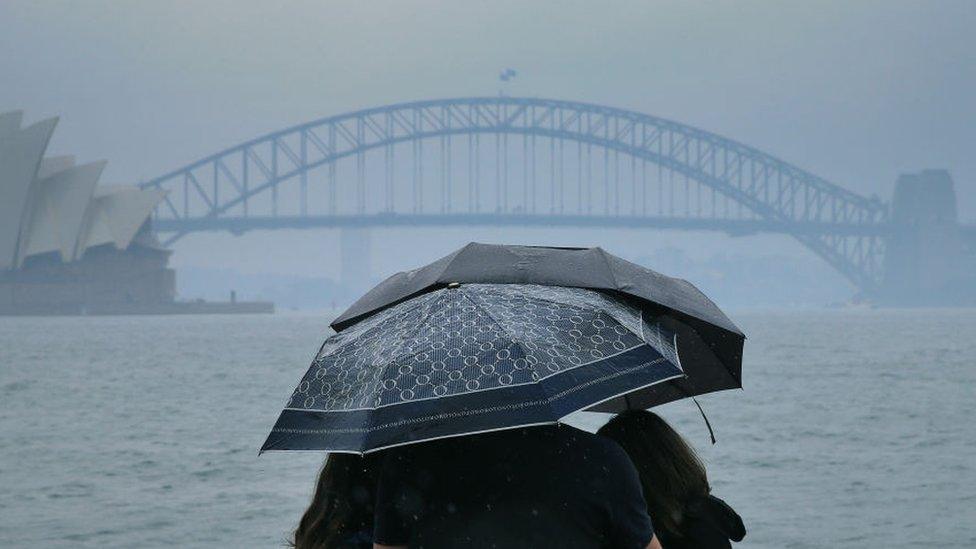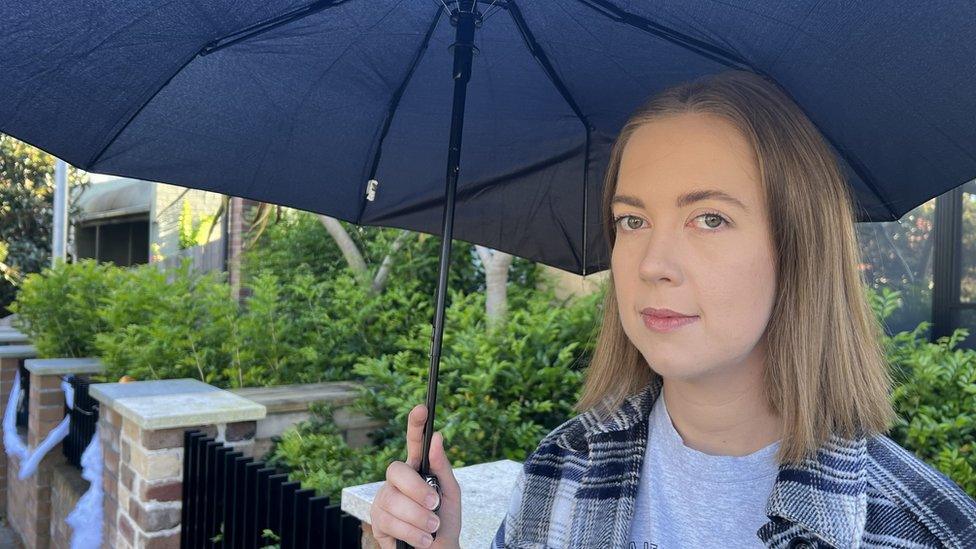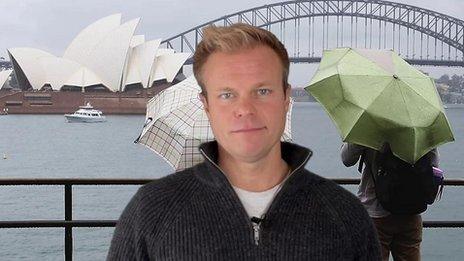Once a comfort, rain is now ruining Australia's mood
- Published

Sydney broke its annual rainfall record in October
"It feels like Groundhog Day. I wake up and it's raining, dark and cold, over and over and over again."
Rebecca Gray feels like it has rained all year in Sydney, Australia. She's not far off the mark.
The city has seen around 170 days of rain so far in 2022 - there have been more rainy days than dry ones. And with almost a quarter of the year still to go, Sydney broke its annual rainfall record last month.
"It's not like we've just scraped in," said Tom Saunders, a meteorologist at the Australian Broadcasting Corporation. "The record has been obliterated. I've never seen anything like it."
More than 2.3m (7.5 feet) of rain has fallen on the city - three times the annual average in London.
It's been a similar story across the rest of Australia's eastern states. Repeated, widespread flooding across all four of them has left thousands of homes uninhabitable and killed more than 30 people this year. Just this past week, two people died as towns in central western New South Wales (NSW) went underwater.
The Bureau of Meteorology says the weather is being driven by several phenomena, including the La Nina pattern which, in Australia, increases the likelihood of rain and cyclones.
It has warned another dangerous couple of months are ahead. With catchments already sopping wet, any downpours could trigger more widespread flooding for eastern and northern Australia.
Killing the 'national mood'
Australia often likes to boast it has warm, sunny beach weather all year round. But this year the country has looked more like humid Singapore, or rainy Cardiff.

Many Australians - like Ms Gray - can feel it dampening their spirits.
"Some days I just don't want to get out of bed," she says, adding that, because of the rain, seeing friends takes much more effort, exercise is confined to indoors, hanging washing out on the line is basically impossible, and the house feels perpetually damp.
"It looks like we've had a new interior designer who really loves wet clothes and black mould."
Even the dog is over it, she says.

Rebecca Gray says she is sick of the weather
The weather is taking a toll on "the national mood", researcher and clinical psychologist Kim Felmingham says.
There's the biological impact: overcast weather blocks sunlight, lowering serotonin - dubbed the body's happy hormone - and affecting sleep.
Then there's the behavioural effect: rain can stop people from getting outdoors and doing activities that give them a sense of wellbeing, achievement, or social connection, Prof Felmingham says.
"All of these contributing factors compound each other. If you've got really relentless rain, we have got clear evidence that can lower mood, lower energy levels and bring a sense of frustration, loneliness or boredom at times," he adds.
A much-loved sound turns into a 'trigger'
But many people are more than just annoyed and sad. They're also exhausted and traumatised.
When the worst floods on record coursed through the town of Lismore in February, Naomi Worrall was lucky to escape with her life. She was forced to wait out the deluge on her roof, alone and terrified for hours.
"If the rain let up at all, it was just enough that you could just hear little cries coming from inside houses," she says. "I thought, I'm listening to people drowning."
Four people died, and when the town flooded again only a month later, a fifth drowned.

The floods devastated Naomi Worrall's home and new business
These days the town is so on edge that even slight showers can send waves of anxiety through it, Ms Worrall says.
"The sound of rain on the roof, it's an Australian comfort. Everyone loves that sound. And if there's one thing I've heard nearly everyone talk about, it's the grief they feel for one of their favourite sounds being turned into a trigger."
'Where next - and who next?'
The last two years of dramatic flooding followed record-breaking bushfires and drought. While Australia has always been a land of extremes, experts say climate change is making these phenomena worse and more frequent.
It is creating a mental health crisis, health professionals warn.
"People are not getting a chance to recover in between," says clinical psychiatrist Cybele Dey, a member of Doctors for the Environment Australia. "And for people who've experienced multiple disasters, it's not just the sum of the impacts… it's compounding."
A survey - conducted several disasters ago, in 2020 - found about 55% of the population reported having a direct experience of at least one. That number is likely to have grown since.
The same study also found that one in four respondents showed clinical signs of post-traumatic stress, external. And about one in 10 people had developed what psychologists are calling "eco anxiety" - increased feelings of distress or anxiousness about the future of the planet.
"Even if you're not directly affected by these events, you know of someone [who is], or you are witnessing really palpable effects of them," Prof Felmingham says. "There's this question of, well, where next and who next?"
Watch: Anger and trauma in Australia’s flood aftermath
Dr Dey says those results are reflected in the stories she hears from colleagues: more people are presenting to them with significant distress about climate change.
And she thinks that trend will only grow stronger: "Children who are born now can expect to experience several times more fossil-fuel-driven disasters than their grandparents."
Building mental resilience
Improving Australia's mental resilience to disasters will be vital, Dr Dey argues.
People who prepare for disasters - by making evacuation plans, for example - tend to feel less distress and recover more quickly than those who don't, research by the Australian Red Cross, external indicates.
Training in mental health first aid, seeking support from people with similar experiences, and channelling stress into something productive can also help, Dr Dey says.
But stronger action on climate change from the government would also significantly improve people's wellbeing, she says. "They can see that their distress matters and that action is being taken," she says. "People need to be able to see reason for hope."
Ms Worrall meanwhile is attempting to make peace with the rain - by planting flowers, among other things.
"I'm trying to remind myself rain is essential to life and it's a good thing," she says. "It can't be an enemy forever."
Related topics
- Attribution
- Published11 October 2022

